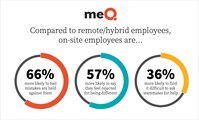Reluctance to return is more than just the commute
BOSTON, Sept. 13, 2022 /PRNewswire/ — Remote employees have enjoyed better work-life balance, no commute, and the ability to work anywhere, however, a new meQuilibrium survey of 3,900 employees sheds new light on why people are reluctant to return to office — remote and hybrid employees have a higher degree of psychological safety at work than on-site employees. On-site employees said they are 66% more likely to feel like mistakes are held against them, they are 57% more likely to say that people are rejected for being different, and 36% more likely to find it difficult to ask teammates for help.
“There is a real difference in psychological safety among work settings,” said Brad Smith, PhD., Chief Science Officer, meQuilibrium. “In many remote-for-the-first-time environments where everybody is the same size square on the video call, it’s often easier to speak up and be heard.”
The survey found that those working on-site are less likely to feel at ease discussing difficult topics, less likely to feel safe taking risks and less likely to feel that the team respects and values each other. Nearly half (44.5%) of the employees surveyed said they would quit if there was a requirement to work on site without a remote or hybrid option.
A lack of psychological safety at work can have repercussions on a business. Teams where members don’t feel comfortable taking a risk to raise a new idea or suggest a new approach will have difficulty innovating. In order for organizations to be successful, its people need to feel comfortable speaking up, asking questions, and disagreeing with team members and managers.
Considering psychological safety across different levels of resilience, the study found that 60% of employees with low resilience and low psychological safety feel burned out and 34% are thinking about quitting their job. Just 5% of highly resilient employees who feel psychologically safe reported feeling burned out and just 3% were thinking about quitting.
“As employers continue to consider how best to structure the workplace, leaders will need to address this very real gap in psychological safety across work settings in order to ensure that innovation, creativity and change-readiness is not compromised in the return to on-site work,” Dr. Smith said.
The full meQuilibrium study can be found here.
Methodology: Approximately 3,900 members participated in meQuilibrium’s July check-in, which examined worker wellbeing and the psychological safety of remote, hybrid and on-site workers.
meQuilibrium is the #1 digital solution for building employee resilience at scale for Fortune 500 global enterprises, helping businesses innovate and navigate uncertain times. meQuilibrium harnesses the science of resilience, AI, predictive analytics, biometrics and neuroscience to help businesses build workforce wellbeing and potential. meQuilibrium continues to grow at a rapid pace, with revenue increasing at a three-year compound annual growth rate of 50%. meQuilibrium has been recognized for its growth by the Inc. 5000 list four years in a row and has been honored with numerous other awards including The Financial Times and Statista Americas’ Fastest Growing Companies 2021, 2022 WELCOA Well-being Trailblazer Award, 2020 HR Tech Innovation Award and Deloitte’s 2020 and 2019 Technology Fast 500 Award. Learn more at https://www.meQuilibrium.com.
Media contact:
Beth Brody
344479@email4pr.com
908-295-0600
SOURCE meQuilibrium


